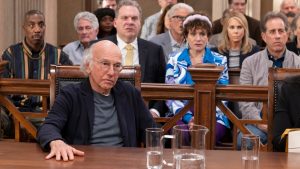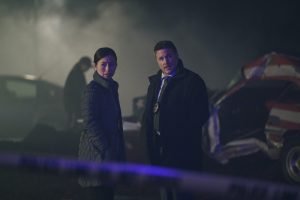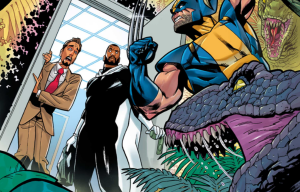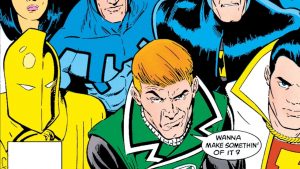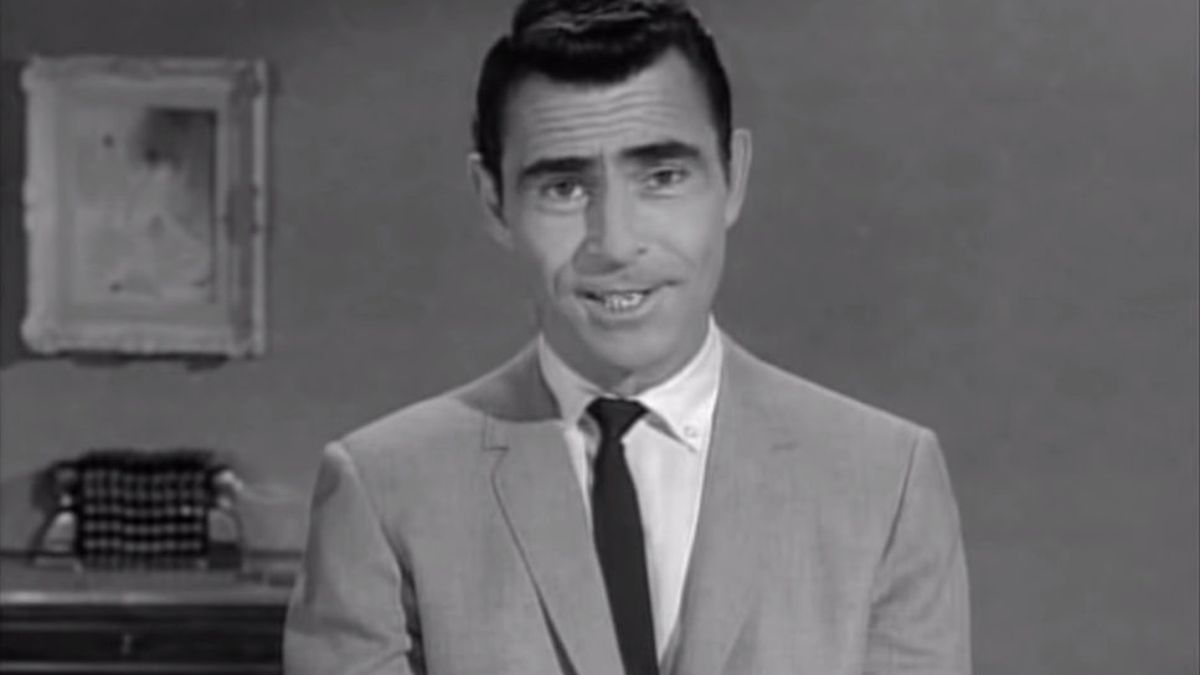
While The Twilight Zone solidified its place in the cultural canon decades ago, there are times when it feels like we’re only scratching the surface of Rod Serling’s revolutionary series. Many of us know classic episodes like “To Serve Man,” “Time Enough at Last,” and “The Monsters are Due on Maple Street” due to their TV rerun presences and the countless references to them in other works over the years. Those episodes deserve all the acclaim they’ve acquired (if not more), but it sometimes feels like we really only talk about 20-25 episodes out of The Twilight Zone‘s original run of 156 episodes when we talk about that series.
In those other 130+ episodes, you’ll find not just some hidden gems but the heart of the show. At its core, The Twilight Zone was a variety series that often took some big creative risks. Not all of those risks paid off, but those that did often showcase sides of The Twilight Zone that aren’t always on display in that handful of episodes that remain syndication staples. When you watch these underrated episodes that are often left out of the popular cultural conversations about this series, you may start to wonder if we’ve also been underrating The Twilight Zone itself.
Perchance to Dream – Season 1 Episode 9
For the last several nights, Edward Hall has endured a series of nightmares that play out like a movie. More than just bad dreams, these subconscious stories are starting to trigger Hall’s heart condition and cause him physical pain. Hall confesses to a psychiatrist that he has stopped sleeping altogether out of fear that the next dream he has will be the one that finally kills him.
This episode feels remarkably close to that incredible scene in Mulholland Drive in which Patrick Fischler describes a nightmare he’s been having in tremendous detail and then is forced to confront it. Anyone who has suffered through a prolonged period of repeated bad dreams will find themselves captivated and horrified by Hall’s exhausted description of an incredible scenario that certainly seems real enough to him. Much like that scene in Mulholland Drive, this episode ends on a genuinely shocking beat that reminds you how dark The Twilight Zone could be.
I Shot An Arrow Into The Air – Season 1 Episode 15
Four astronauts find themselves in a terrifying scenario. They’ve just crash-landed on what seems to be an asteroid, they’re low on supplies, and they have no way to call for rescue. As they desperately search for aid, the most cowardly among them begins to kill his friends to claim the few remaining resources for himself. Though he survives long enough to reach help, he makes a shocking discovery. The astronauts never made it off of Earth and instead crashed in a desert somewhere on their home planet.
Granted, this episode isn’t quite as compelling as some of the other classic Twilight Zone episodes that deal with the dangers of desperation, but there is a mystery box element to the story that soon proves to be irresistibly compelling. Actually, between the mysterious drawing in the sand that later proves to be a crude sketch of power lines and the scenes of increasingly desperate attempts at survival, this episode often invokes the very best of Lost in a Twilight Zone way.
The Howling Man – Season 2 Episode 5
David Ellington has a truly incredible story to tell. When he was a younger man walking through Europe, he suddenly found himself caught in the middle of a raging storm. He sought shelter in a local castle that proved to be a kind of monastery filled with devotees who decided to let him in despite their mistrust of strangers. Once inside, he hears a strange howling noise that seems to be coming from a man who claims the monks have imprisoned him. The monks, however, tell a different story. They say that the man they captured is the devil himself.
This episode has gotten a little more love over the years, but it deserves to be considered an all-time classic. Despite some moments of era and format forgivable corniness, this gothic horror story often plays out like a classic Hammer Horror movie. The debate between right and wrong is easy to get caught up in, and the ending is a warm hug of diabolical genre goodness.
The Trouble With Templeton – Season 2 Episode 9
“The Trouble With Templeton” is one of those Twilight Zone episodes that explores the eternal warning “Be careful what you wish for.” In it, we follow famous Broadway actor Booth Templeton as a particularly frustrating day in his life causes him to wish to go back to the way things were. He suddenly finds himself 30 years in the past when things seemed simpler and when the love of his life, Laura, was still alive and by his side. As you may have guessed, Templeton soon discovers that finding happiness isn’t always as simple as going back to the way things were.
It’s a timeless and powerful message highlighted by scenes in which Laura and all of Templeton’s old friends behave in ways he seems to have forgotten about. Those cold water interactions drive home the message that Templeton just doesn’t belong there anymore. As Templeton leaves that nightclub, though, Laura and the rest of the ghosts stop to stare at the door with pain in their eyes. We soon learn that they were putting on a play designed to show Templeton that he still had a life worth living. They would love to be with him as much as he would love to be with them, but Templeton isn’t done living quite yet. It’s a gut-wrenching twist that puts a painful spin on a familiar theme.
Shadow Play – Season 2 Episode 26
After being found guilty of murder and sentenced to death, Adam Grant starts to freak out in court. Hey, who wouldn’t? The strange thing is that Grant seems to believe that he’s been through all of this before and will go through all of this again when he is executed. His only hope of breaking the cycle is to convince the District Attorney to grant a stay of execution before the switch is flipped yet again.
Yes, you could consider “Shadow Play” to be a shockingly early example of what we now refer to as the time loop genre. While it is certainly effective and historically noteworthy as just that, the thing that makes “Shadow Play” so interesting after all these years is its bizarre ending in which Grant wakes up in court yet again only to find that the people from the previous incarnation of this scenario are playing different roles. Is he really just dreaming? Is he stuck in some kind of purgatory for his presumed crimes? The ambiguity of this finale makes it one of The Twilight Zone’s most compelling twists.
The Arrival – Season 3 Episode 2
Flight 107 has just completed its scheduled landing at a small airport. It was a textbook arrival complicated only by the fact that the plane landed without anyone on board. There are no pilots, no passengers…not even a piece of luggage. It is now up to Inspector Grant Sheckly to uncover the mystery behind this seemingly impossible occurrence.
Much of this episode consists of one of my favorite styles of sci-fi and horror: people trying to find logical explanations for supernatural scenarios. It is fascinating to watch Sheckly and his crew slowly eliminate every logical possibility in an effort to locate the truth of the matter. While this episode doesn’t quite stick the landing with its twist ending, the idea that Sheckly is still haunted by the one case he never quite figured out is an effective reminder that the ghosts of the past are permanent residents of The Twilight Zone.
The Grave – Season 3 Episode 7
Bounty hunter Conny Miller has just learned that the outlaw he has been chasing (the notorious Pinto Sykes) has been captured and killed by the residents of a small town. Miller should be celebrating, but he bemoans the fact that he didn’t get to bring Sykes to justice. What’s worse, Sykes accused Miller of being a coward on his deathbed, and the residents of the town are starting to believe that Miller may have indeed been running from Sykes rather than chasing him. The only way for Miller to prove himself is to go to Sykes allegedly cursed grave and plant a knife in the dirt so everyone knows he was there.
Although The Twilight Zone often traveled to the Old West, “The Grave” is one of the only episodes of the show that feels like a proper Twilight Zone version of a classic Western. Granted, this story and its horrifying finale are actually based on an old folk tale, but the atmosphere of the Old West and that thick air of misplaced machismo that goes with it feel like the perfect companions to this often child-like fable about the price of fear.
The Midnight Sun – Season 3 Episode 10
A mysterious event has caused the Earth to shift out of orbit and gradually move closer to the sun. There is no more nighttime, and the days are getting hotter and hotter. Now, two women in a small New York City apartment must try to make the most out of what seems to be humanity’s final days.
“The Midnight Sun” is one of the more acclaimed episodes on this list, but I genuinely believe it deserves to be considered among the very best Twilight Zone episodes ever. It is a hauntingly intimate story that seems to be dealing with the terror of global warming long before we ever put those words to that fear. Its ending, in which we learn that one of our protagonists has dreamt the events of the episode and lives in a reality in which the world is moving away from the sun, both solidifies its environmental message and thrusts us into a darkness as pervasive as the one that doomed woman now lives in.
The Jungle – Season 3 Episode 12
If you’re anything like me, you may have skipped “The Jungle” based on its description alone. The Twilight Zone was often remarkably ahead of its time, but this story of an executive named Alan Richards who believes he has been cursed by a Witch Doctor in Africa feels like it could go wrong in a hundred different ways regardless of its best intentions.
While there are a couple of moments in this story that perhaps would be reexamined under a modern creative light, “The Jungle” is ultimately a story about the dangers of interfering where you don’t belong that is bolstered by some surprisingly strong themes of environmentalism. More importantly, this episode features one of the most effective sequences in Twilight Zone history; a Cat People-like prolonged walk through the city in which Richards is pursued by the persistent noise of drums and an unseen predator. That final shot is also just a chef’s kiss bit of absurdity.
The Changing of the Guard – Season 3 Episode 37
After 51 years of service, Professor Ellis Fowler (played by the delightful Donald Pleasence) has just been informed that he will be forced to retire. Suddenly struck by the idea that he failed to do anything meaningful with this time in his life that is almost over, he decides to kill himself on Christmas Eve. Before he can go through with it, though, he is confronted by students from the past and present who are here to show him the true value of his considerable efforts.
The Twilight Zone is often remembered for its shocking twists that typically deliver a cruel piece of fate to the deserving and undeserving alike. Every now and then, though, the series would demonstrate something truly extraordinary: hope for the world and the people in it. “The Changing of the Guard” is one of the most poignant examples of that powerful (if often forgotten) side of the show. If you’re looking for more Twilight Zone Christmas tear-jerkers, be sure to check out the equally incredible “Night of the Meek.”
The Thirty-Fathom Grave – Season 4 Episode 2
While on patrol, a U.S. Navy vessel detects a strange noise coming from the ocean. A closer inspection reveals that the noise originates from a sunken submarine. It seems that someone, or something, is stuck inside the submarine and is banging on its walls. As the officers discuss ways to investigate the interior of the vessel, one nightmare-plagued crewmembers suggests that whatever is down there should be left alone.
The hourlong episodes of The Twilight Zone’s fourth season often go overlooked. They rarely even appear in syndication these days. While it’s true that the show’s fourth season is a largely failed experiment filled with misfires, “The Thirty-Fathom Grave” is one of that season’s brightest hidden gems. It presents a compelling scenario and uses every bit of that extended runtime to explore its many possibilities. It’s also one of the absolute scariest Twilight Zone episodes ever.
On Thursday We Leave for Home – Season 4 Episode 16
Years ago, colonizers from Earth settled on a remote planet to form a new society. When they discover that the planet is less hospitable than previously anticipated, they decide to send a message to Earth asking for assistance. Decades later, a spaceship crew finally arrives to take them home. The only problem is that the leader of the colonizers, Captain Benteen, doesn’t wish to leave this little corner of the galaxy where he is beloved and in command.
This story is certainly a warning about the corruption of power. It is remarkably easy to sympathize with Benteen’s plight, though. Benteen isn’t necessarily a bad person; he’s just terrified of starting over and losing the cause and the people that he has dedicated his life to. Yet, as we watch Benteen regret his decision to stay as the only rescue ship he will ever see leaves him stranded on that planet forever, we are reminded that even the noblest intentions can be twisted by fear.
The Self-Improvement of Salvadore Ross – Season 5 Episode 16
Salvadore Ross is, to use the parlance of our times, a real asshole. He is also in love with a woman named Leah Maitland who wisely denies him a second chance. One day, Ross wakes up to realize that he has the power to trade aspects of himself with others. Ross believes he can use this power to acquire the means and traits Maitland believes he lacks, though he soon finds that Maitland may have been right about those parts of him that can’t easily be washed away.
Interestingly, Arnold Schwarzenegger went on to direct an episode of Tales From the Crypt called “The Switch” which features a remarkably similar premise. I only mention that to emphasize the ways this episode sometimes feels a little too dark even for the later seasons of The Twilight Zone. It’s a twisted and clever story that forces us to confront our perception of self-improvement. Do we really wish to make ourselves better people, or do we just want to see our worst qualities magically vanish so we can quickly get the things we want?
I Am the Night—Color Me Black – Season 5 Episode 26
A man named Jagger has been convicted of killing a bigot in a small town and is sentenced to be executed in the morning. The strange thing is that the sun refuses to rise over the town that day. That occurrence causes the local sheriff to start asking a lot of tough questions about the investigation into that murder that he conveniently chose to ignore before. He and others grow to believe the strange darkness may be related to the upcoming hanging, but can they convince anyone else that is the case?
Though The Twilight Zone regularly addressed several social and human issues throughout its incredible initial run, Rod Serling was always especially passionate about using his platform to address the horrors of racism and prejudice. Yet, few episodes in the original run of The Twilight Zone address those topics as directly as this one. Granted, the ending is a little heavy-handed, but the message is frighteningly relevant. We’d like to think that if all the hatred, prejudice, and anger we put into the world manifested itself as literal darkness, we’d maybe stop to reexamine our ways. Time and time again, though, we are reminded that there is no omen so obvious that it can’t be twisted or simply ignored by those who refuse to change.
The Jeopardy Room – Season 5 Episode 29
Major Ivan Kuchenko is a political defector who is biding his time in a shabby hotel room while he waits to be taken to his new home. This purgatory period between the past and future is interrupted by a message from an assassin who informs Kuchenko that he has placed a bomb somewhere in his hotel room. Kuchenko has three hours to find and disarm it before it goes off. If he tries to leave the room, he will be shot by a sniper positioned directly across the street.
This single-room (mostly) thriller hardly even feels like a traditional Twilight Zone episode. There are no supernatural/sci-fi elements, no deeper hidden meanings, and while there’s a slight surprise at the end, it’s hardly a twist. Instead, this episode is simply a finely tuned thriller that was directed by none other than Richard Donner and stars a young Martin Landau. It’s an incredible piece of television that also happens to remind us how versatile the Twilight Zone could be.
The post The Most Underrated Twilight Zone Episodes appeared first on Den of Geek.
